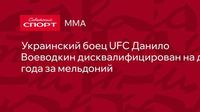Ukrainian mixed martial arts fighter Danilo Voevodkin has been handed a two-year disqualification due to a positive doping test for meldonium. This sanction, reported by the UFC's press service, results from a doping sample taken from Voevodkin on October 17, 2024, which indicated the presence of the banned substance. Voevodkin's suspension from participating in professional fights began on November 10, 2024.
The independent organization for combating doping in martial arts (CSAD) played a pivotal role in the decision to disqualify Voevodkin. Following standard anti-doping protocols, Voevodkin’s sample was collected during an off-competition period after he participated in Dana White's Contender Series in Vilnius, Lithuania.
Voevodkin's rise to fame in the UFC was marked by him securing a contract after winning the aforementioned series. However, this promising beginning has been marred by the recent doping controversy. Remarkably, Voevodkin has yet to compete in a match within the UFC, despite entering the organization as an undefeated fighter with a record of seven wins in mixed martial arts.
This ban raises serious questions surrounding the integrity of athletes in combat sports. Doping violations are taken very seriously within the realms of the UFC and broader martial arts community, often resulting in significant penalties for those caught. As the effects of doping controversies continue to echo through the world of sports, Voevodkin's situation stands as a cautionary tale for up-and-coming fighters.
As Voevodkin navigates the implications of this suspension, the sport also grapples with the pervasive issue of performance-enhancing substances. Meldonium, first developed to treat heart conditions, has gained notoriety for its use in sports, having been banned by many athletic organizations worldwide. The complexity of doping regulations sometimes leaves athletes in a precarious position, raising debates about fairness and accountability.
In light of these developments, the UFC has reaffirmed its commitment to maintaining a clean competitive environment. "This is a stark reminder that we will not tolerate doping violations in our organization," stated a UFC representative following the announcement of Voevodkin's disqualification. The UFC and officials from CSAD continue to emphasize the importance of clean sport and the integrity of competitions.
Looking ahead, Voevodkin will need to reflect on his career decisions and the importance of adhering to anti-doping rules. His two-year suspension not only halts his immediate career path within the UFC but also casts a shadow over his previous achievements in the sport.
As the landscape of mixed martial arts evolves, it is crucial for fighters to understand the legalities and strict regulations regarding substances that can jeopardize their careers. Voevodkin's case exemplifies the pressures athletes face when striving for success in high-stakes environments.
In conclusion, Danilo Voevodkin’s two-year disqualification for a doping violation serves as a significant reminder of the rigorous standards upheld in professional sports. With his future in the UFC uncertain, Voevodkin's experience illustrates the critical need for awareness and compliance with anti-doping standards among athletes, to preserve the spirit and integrity of the sport.





